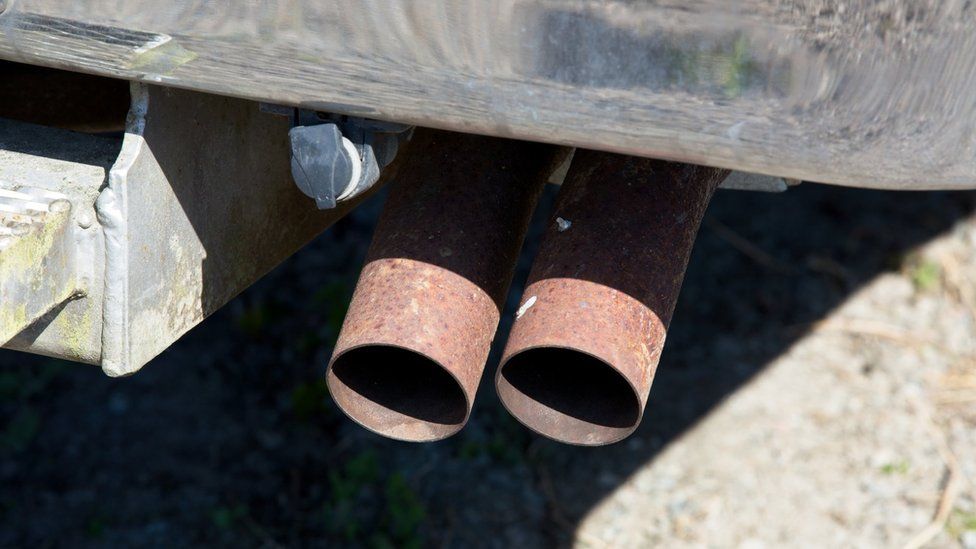Blaby: Air pollution fall seen in three road areas
Blaby: Air pollution fall seen in three road areas BBC


The air quality in parts of Leicestershire improves, government list updated

Getty Images
Lifestyle changes
High levels of air pollution are linked to the onset of heart disease and cancer, with nitrogen dioxide in particular linked to respiratory problems such as asthma and bronchitis.
Five roads in Blaby had previously been declared pollution “hotspots”, where nitrogen dioxide levels from traffic were above official limits.
Now three of these, on Narborough Road South, the B4114 in Enderby and Narborough and Enderby Road, Whetstone, may be revoked.
But a new hotspot could be declared in Fosse Park due to emission levels.
Blaby District Council has been monitoring the five Air Quality Management Areas (AQMA) for the past five years.
The council said consistently low levels of nitrogen dioxide, well below government targets (including before and after the pandemic) meant they would be asking for three AQMAs to be lifted.
Les Phillimore, the authority’s portfolio holder for housing, community and environmental services, said: “Even as traffic has returned to pre-pandemic levels we have not seen a return to the pre-pandemic environmental issues.
“There are more and more electric vehicles moving around, there was a huge shift during Covid to e-commerce and a lot of those ‘last mile’ delivery vehicles are electric now.
“What will also see an air quality benefit is the amount of people no longer travelling to work at those peak periods.”
Residents living near the three areas will be advised of the new status and actions taken which have reduced the nitrogen dioxide levels.
AQMAs will remain on the A47, Hinckley Road in Leicester Forest East and Mill Hill in Enderby.
The council said the new area of concern, on the junction of Lubbesthorpe Road and Narborough Road South, would be monitored closely.

Follow BBC East Midlands on Facebook, on Twitter, or on Instagram. Send your story ideas to eastmidsnews@bbc.co.uk.
Related Topics
Related Internet Links
SDGs, Targets, and Indicators
-
SDGs addressed or connected to the issues highlighted in the article:
- SDG 3: Good Health and Well-being
- SDG 11: Sustainable Cities and Communities
- SDG 13: Climate Action
-
Specific targets under those SDGs based on the article’s content:
- SDG 3.9: By 2030, substantially reduce the number of deaths and illnesses from hazardous chemicals and air, water, and soil pollution and contamination.
- SDG 11.6: By 2030, reduce the adverse per capita environmental impact of cities, including by paying special attention to air quality and municipal and other waste management.
- SDG 13.1: Strengthen resilience and adaptive capacity to climate-related hazards and natural disasters in all countries.
-
Indicators mentioned or implied in the article:
- Nitrogen dioxide levels from traffic
- Air Quality Management Areas (AQMA)
- Consistently low levels of nitrogen dioxide
- Emission levels
- Number of electric vehicles
- Reduction in peak period travel
Table: SDGs, Targets, and Indicators
| SDGs | Targets | Indicators | ||||
|---|---|---|---|---|---|---|
| SDG 3: Good Health and Well-being | SDG 3.9: By 2030, substantially reduce the number of deaths and illnesses from hazardous chemicals and air, water, and soil pollution and contamination. | Nitrogen dioxide levels from traffic | ||||
| SDG 11: Sustainable Cities and Communities | SDG 11.6: By 2030, reduce the adverse per capita environmental impact of cities, including by paying special attention to air quality and municipal and other waste management. | Air Quality Management Areas (AQMA) | Consistently low levels of nitrogen dioxide | Emission levels | Number of electric vehicles | Reduction in peak period travel |
| SDG 13: Climate Action | SDG 13.1: Strengthen resilience and adaptive capacity to climate-related hazards and natural disasters in all countries. | Emission levels |
Behold! This splendid article springs forth from the wellspring of knowledge, shaped by a wondrous proprietary AI technology that delved into a vast ocean of data, illuminating the path towards the Sustainable Development Goals. Remember that all rights are reserved by SDG Investors LLC, empowering us to champion progress together.
Source: bbc.com

Join us, as fellow seekers of change, on a transformative journey at https://sdgtalks.ai/welcome, where you can become a member and actively contribute to shaping a brighter future.







